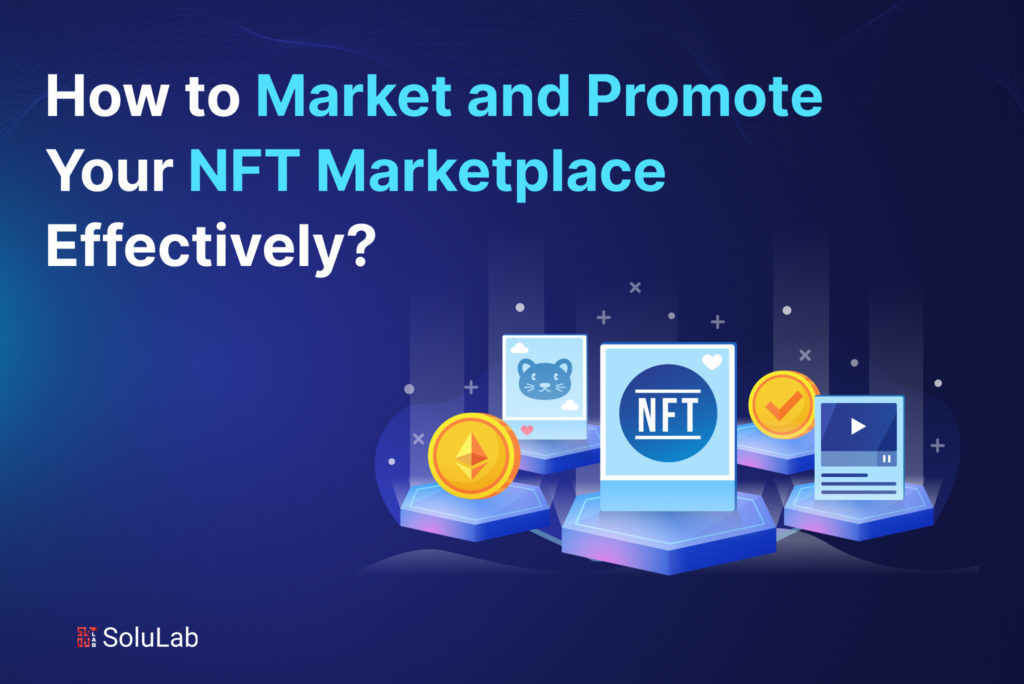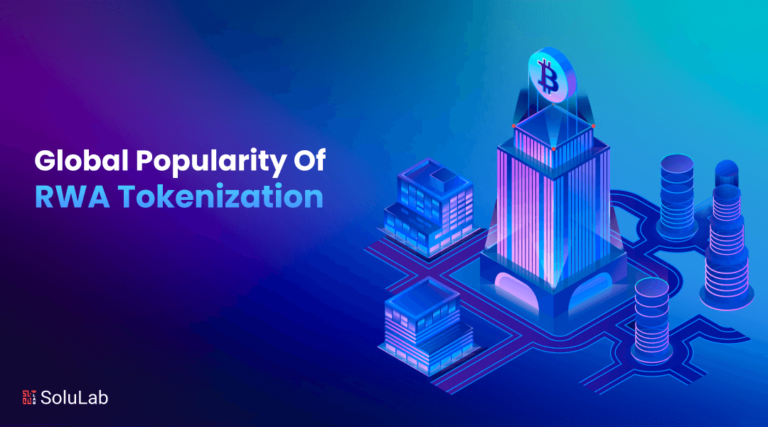Non-fungible tokens (NFTs) have emerged as a game-changing innovation in the fast-growing field of digital assets. These unique, indivisible tokens, often representing digital or physical assets, have created a buzz in the art, entertainment, and collectibles industries. As NFTs gain widespread recognition, so do the platforms that facilitate their creation, sale, and exchange—NFT marketplaces.
Launching your NFT marketplace is an exciting venture, but in a landscape becoming increasingly crowded, effective marketing and promotion are key to standing out. In this blog, let’s explore strategies and best practices to help you successfully market and promote your NFT marketplace.
Understanding Your Niche-to-Market NFT Marketplace
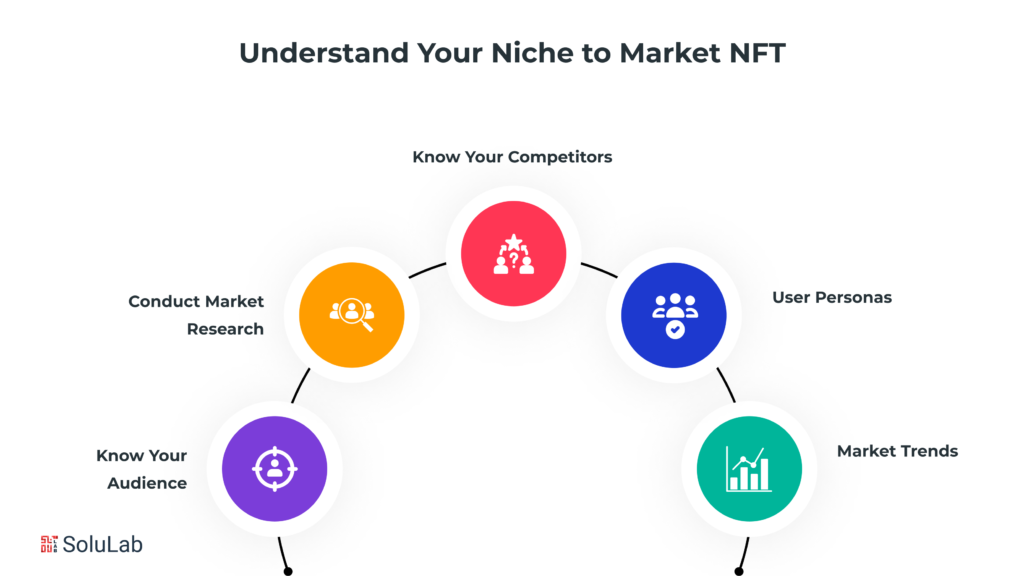
Know Your Audience: One of the first steps in marketing your NFT marketplace effectively is understanding your target audience. NFTs cover a broad spectrum, from digital art and music to virtual real estate and collectibles. To tailor your marketing efforts, you must identify your niche within the NFT space. Consider the following questions:
- What types of NFTs will your platform primarily feature?
- Who are the potential buyers and creators in your chosen niche?
- What are their interests, preferences, and motivations for engaging with NFTs?
Conduct Market Research: Conducting thorough market research is crucial. It helps you gain insights into your potential users and competitors. Explore existing NFT marketplaces within your niche to understand what works and what gaps you can fill. Research your target audience’s online behavior and interests to craft targeted marketing campaigns.
Know Your Competitors: To succeed in your NFT marketplace venture, you need to be aware of the competition. Analyze other NFT marketplace platforms within your niche, noting their strengths, weaknesses, and strategies. Identify gaps or areas where your marketplace can offer something unique. Your goal is not just to replicate what others are doing but to find a distinct position in the market.
User Personas: Create detailed user personas to represent your target audience segments. These personas should include demographic information, behaviors, goals, and pain points. Understanding your users on a personal level will help you tailor your marketing efforts to resonate with them effectively.
Market Trends: Stay up-to-date with trends in the NFT space and your niche. Monitor the kinds of NFTs that gain attention and the artists or creators making waves. Knowing what’s trending can help you curate your platform’s content and anticipate user preferences.
Read Also: Solana NFT Marketplace: How to build your own NFT Marketplace on Solana
Creating a Unique Selling Proposition (USP) for Your NFT Marketplace
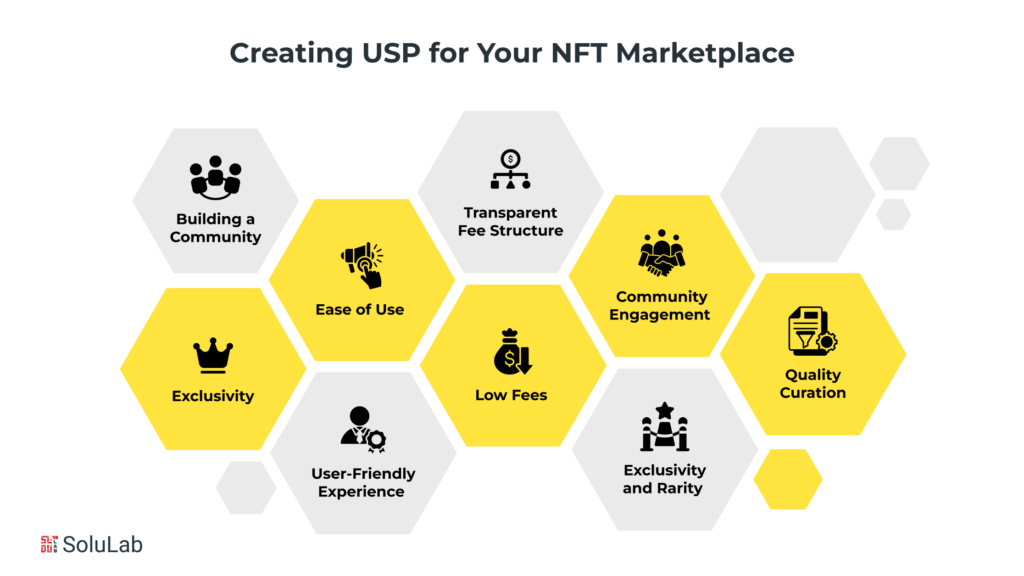
In a crowded NFT marketplace services/landscape, having a Unique Selling Proposition (USP) is paramount. Your USP should clearly communicate what sets your platform apart from the competition and why users should choose your marketplace. Consider the following strategies to create a compelling USP:
- Exclusivity: Offer exclusive NFT drops or collaborations that users can’t find elsewhere. Limited editions and unique partnerships can generate buzz and attract both creators and collectors.
- Ease of Use: Ensure your platform is user-friendly and intuitive. A seamless user experience, from creating an account to minting NFTs and making transactions, can be a strong selling point.
- Low Fees: Consider competitive fee structures for creators and buyers. Transparent fee policies can be a significant attraction.
- Community Engagement: Build a strong and engaged user community around your platform. Active communities can foster loyalty, word-of-mouth marketing, and valuable feedback.
- Quality Curation: Curation is the key to ensuring that your platform showcases high-quality NFTs. Avoid clutter and low-value items in your marketplace. Implement a rigorous curation process to ensure that only valuable and authentic NFTs are featured.
- Exclusivity and Rarity: Exclusivity is a powerful driver in the NFT market. Offer limited edition NFT drops or partnerships with renowned creators to create a sense of rarity and value. Scarcity often drives demand, and collectors are often drawn to the idea of owning something unique or one-of-a-kind.
- User-Friendly Experience: The user experience is critical. Make sure your platform is simple to use and comprehend. From creating accounts to minting NFTs and conducting transactions, every step should be intuitive. Complex or confusing processes can deter users.
- Transparent Fee Structure: Be transparent about your fee structure. Hidden or unclear fees can lead to mistrust among users. Consider competitive fees for creators and buyers, and clearly communicate how fees are calculated and applied.
Know More: Best Tron NFT Marketplace Platforms of 2023
- Building a Community: Community building is essential. Encourage interactions among users, such as discussions, feedback sharing, and collaborations. Actively engage with your community on social media and within your platform to foster a sense of belonging.
Marketing Strategies for Your NFT Marketplace
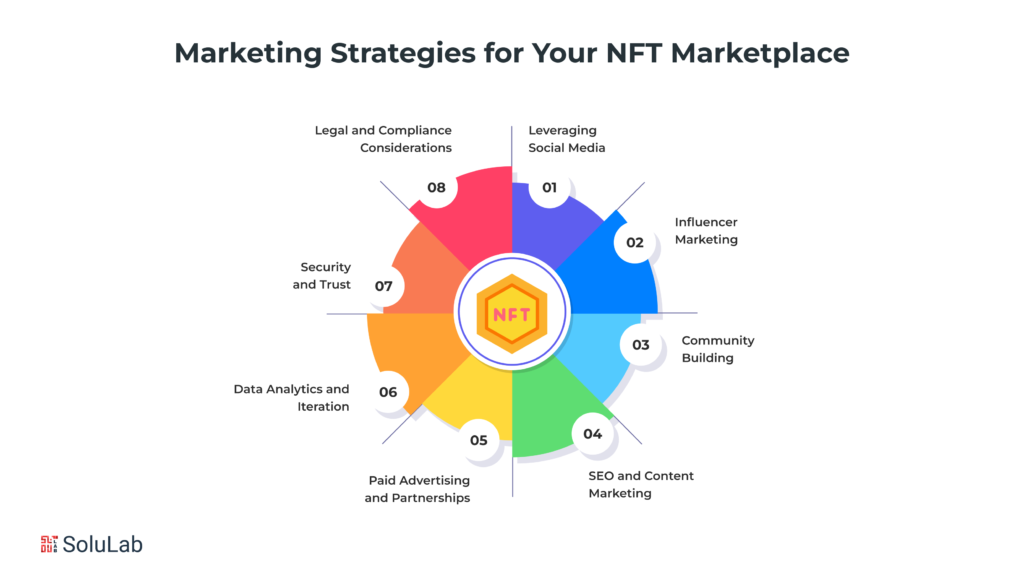
With a clear understanding of your niche and a compelling Unique Selling Proposition (USP), it’s time to dive into effective marketing strategies for your NFT marketplace. Successful promotion involves reaching your target audience, building trust, and creating a buzz. Here are essential strategies to consider:
1. Leveraging Social Media
- Harness the Power of Visual Platforms: Visual content is a cornerstone of NFT marketing. Utilize platforms like Instagram and Pinterest to showcase NFT artwork and assets. Regularly post high-quality visuals and engage with your audience through comments, likes, and shares.
- Twitter Engagement: Twitter is a hub for NFT discussions and announcements. Build a strong presence on Twitter by following key players in the NFT community, participating in conversations, and sharing updates about your marketplace.
- Discord Communities: Discord is a popular platform for NFT communities. Create and manage a Discord server for your marketplace to facilitate discussions, host AMAs (Ask Me Anything sessions), and engage with your community.
2. Influencer Marketing
- Identify Niche Influencers: Collaborate with influencers within your niche. These influencers can promote your platform to their dedicated followers who are interested in NFTs within your chosen category. Authentic endorsements can drive significant traffic.
- Sponsored Content: Consider sponsoring influencer content, such as YouTube reviews, live streams, or blog posts that feature your platform. Make sure the material is relevant to your USP and connects with your target audience.
Have A Look At Our Blog: How to Build an NFT Marketplace from Scratch
3. Community Building
- Foster Community Engagement: Actively engage with your community through regular updates, discussions, and contests. Encourage user-generated content, such as showcasing user-created NFTs on your platform or social media.
- Feedback Loops: Listen to user feedback and implement changes based on their suggestions. When users feel heard and see improvements, they’re more likely to become loyal advocates for your platform.
- Events and Virtual Gatherings: Host virtual events, webinars, or conferences related to your niche. These gatherings provide opportunities for networking, learning, and showcasing NFTs.
4. SEO and Content Marketing
- Content Creation: Develop high-quality, informative content related to NFTs in your niche. Create blog posts, guides, tutorials, and videos that address common questions and challenges faced by your target audience.
- Keyword Optimization: Optimize your content for relevant keywords. Use tools like Google Keyword Planner to identify search terms that your potential users are looking for.
- Guest Posting: Contribute guest posts to established blogs and websites within your niche. This not only builds backlinks but also establishes your platform as an authority.
5. Paid Advertising and Partnerships
- Targeted Ads: Invest in paid advertising efforts on sites such as Google Ads or Facebook. Target specific demographics, interests, and behaviors that align with your niche.
- Strategic Partnerships: Collaborate with other NFT marketplaces, artists, or influencers for joint promotions. Partnerships can expand your reach and introduce your platform to new audiences.
Read Also: Benefits Of An NFT Marketplace On Cardano
6. Data Analytics and Iteration
- Track User Behavior: Utilize web analytics tools to monitor user behavior on your platform. Analyze which NFTs are gaining traction, how users navigate your site, and where they drop off.
- A/B Testing: Conduct A/B tests to optimize different elements of your platform, such as landing pages, call-to-action buttons, or email subject lines. Data-driven improvements can enhance user engagement and conversions.
- Iterate and Adapt: Continuously iterate your marketing strategies based on data insights. What works today may not work tomorrow in the dynamic NFT landscape.
7. Security and Trust
Building and maintaining trust is paramount in the NFT marketplace development. Here are essential steps to enhance security and instill trust among users:
- Secure Transactions: Implement robust security measures for transactions, including encryption and multi-factor authentication. Users should feel confident about the safety of their assets.
- Smart Contract Audits: If your platform uses smart contracts, ensure they undergo rigorous security audits to prevent vulnerabilities and potential hacks.
- QR Codes for Easy NFT Access: Beyond authentication, the QR code Generator can be used to simplify NFT transfers and access. Users can scan a QR code to view, share, or display their NFTs without needing to log into their wallets manually. This is particularly useful for physical NFT integrations such as digital artwork linked to QR codes on event tickets, merchandise, or real-world collectibles.
- Verified Profiles: Offer profile verification for creators and collectors. Verified profiles can add a layer of trust, assuring users of the authenticity of participants.
- Transparent Policies: Clearly communicate your platform’s policies, including fee structures, dispute resolution, and ownership rights. Transparency fosters trust among users.
Read Our Blog: What are some White-Label NFT Marketplace Solutions?
8. Legal and Compliance Considerations
Navigating the legal landscape is essential for the long-term sustainability of your NFT marketplace development :
- Regulatory Compliance: Stay informed about regulations related to NFTs and cryptocurrencies in your jurisdiction. Comply with anti-money laundering (AML) and know-your-customer (KYC) requirements if necessary.
- Intellectual Property Rights: Implement policies to protect intellectual property rights. Ensure that creators have the appropriate rights to mint and sell NFTs on your platform.
- Terms of Service and Privacy: Draft comprehensive terms of service and privacy policies that govern user interactions on your platform. Clearly outline user responsibilities and data handling practices.
Conclusion
Effectively marketing and promoting your NFT marketplace is a multifaceted endeavor that combines understanding your niche, creating a compelling USP, and implementing a range of strategies to reach your target audience. By leveraging social media, engaging influencers, building a strong community, and focusing on security and compliance, you can establish a reputable presence in the NFT ecosystem.
In this dynamic landscape, adaptability and data-driven decision-making are key. Continuously assess your marketing efforts, listen to user feedback, and evolve your strategies to meet the changing demands of NFT development companies. With the right approach and dedication, your NFT marketplace can thrive and contribute to the growing world of digital assets.
SoluLab is a leading blockchain and software development company known for its innovative solutions in the digital landscape. With a commitment to cutting-edge technology and a track record of successful projects, SoluLab has established itself as a trusted partner for businesses seeking to navigate the evolving world of blockchain and NFTs (Non-Fungible Tokens). Their expertise extends to creating secure and user-friendly NFT marketplaces, aligning perfectly with the topic of effectively marketing and promoting such platforms. By leveraging SoluLab’s technical prowess and industry insights, businesses can not only develop unique NFT marketplaces but also gain the guidance needed to implement marketing and promotional strategies that resonate with their target audiences.
Our NFT Website Development Company offers secure and customizable NFT marketplace development services, emphasizing user-friendliness and security through digital wallets and smart contracts. We have a team of experienced NFT developers specializing in cryptocurrency and blockchain solutions, providing top-tier NFT services, including blockchain technology and smart contract development for process automation. Our user-friendly and advanced platform development, along with highly secure digital wallets tailored to your business needs, ensures a seamless NFT experience. Contact SoluLab today to explore our NFT solutions.
FAQs
1. What is the role of market research in promoting an NFT marketplace?
Market research is essential for understanding your target audience, competitors, and trends within your niche. It helps you tailor your marketing efforts, create user personas, and identify opportunities for differentiation. By conducting thorough research, you can make informed decisions and refine your strategies to effectively reach your audience.
2. How can I create a Unique Selling Proposition (USP) for my NFT marketplace?
Creating a USP involves identifying what makes your platform unique. You can do this by offering exclusive NFT drops, ensuring a user-friendly experience, setting transparent fee structures, fostering community engagement, and emphasizing quality curation. Your USP should clearly communicate why users should choose your marketplace over others.
3. Why is community building important for an NFT marketplace?
Community building is crucial for several reasons. It fosters user loyalty, encourages word-of-mouth marketing, and provides valuable feedback. A strong community can also enhance the reputation and credibility of your marketplace. Active engagement with your user base can create a sense of belonging and trust, making users more likely to return and participate.
4. How can I ensure the quality of NFTs in my marketplace?
Quality curation is key to maintaining the reputation and trustworthiness of your NFT marketplace. Implement a rigorous curation process that includes verifying the authenticity of NFTs and ensuring they meet your platform’s quality standards. Avoid clutter and low-value items by carefully selecting which NFTs to feature on your platform.
5. What legal and compliance considerations should I be aware of when operating an NFT marketplace?
Operating an NFT marketplace comes with legal and regulatory responsibilities. You may need to address issues such as copyright infringement, intellectual property rights, tax compliance, and data privacy. Consult with legal experts who specialize in blockchain and digital assets to ensure that your platform operates within the bounds of relevant laws and regulations.


